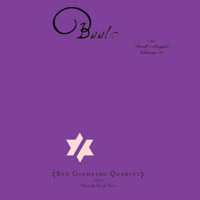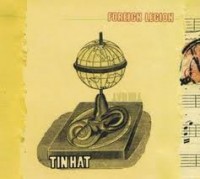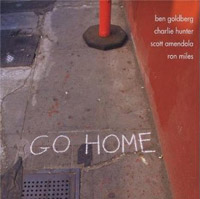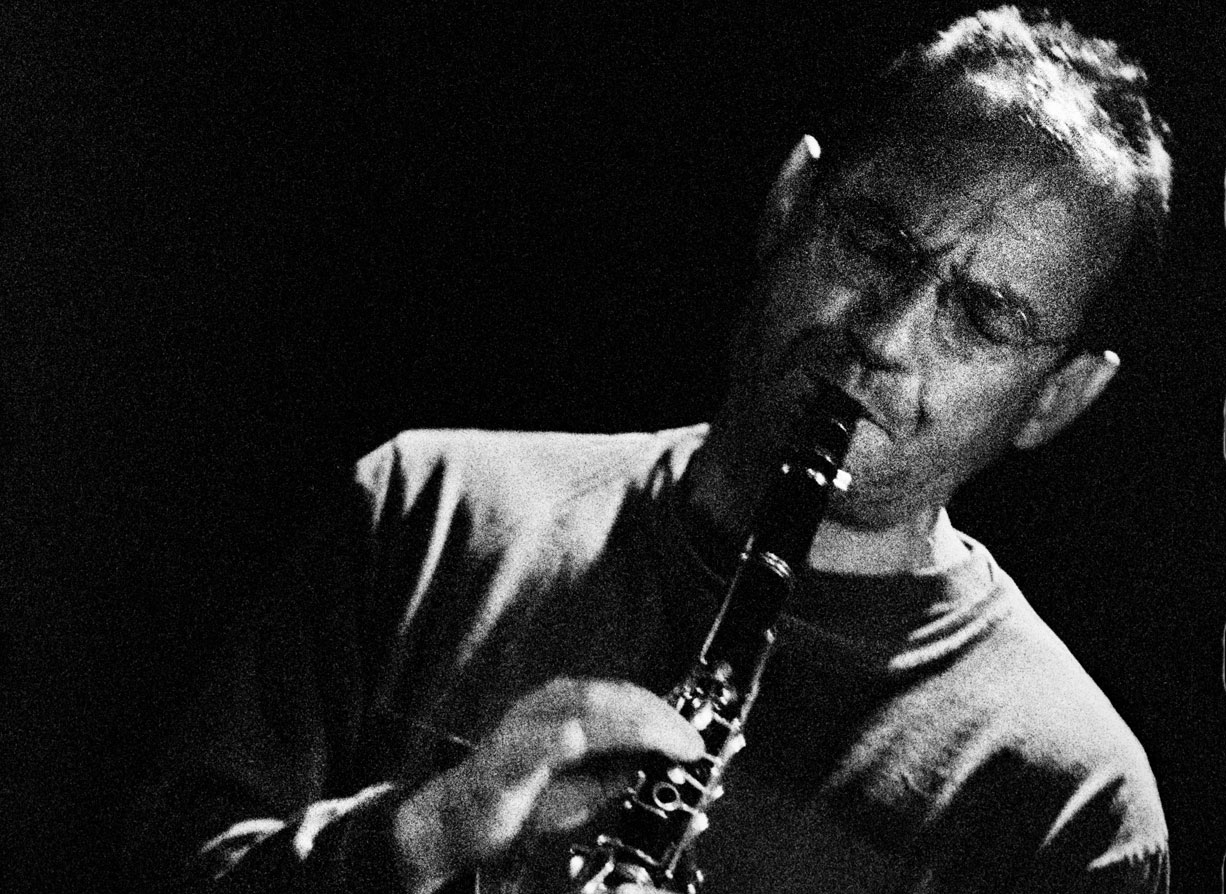Ben Goldberg: “Asimor”
[audio:https://alarm-magazine.com/wp-content/uploads/2010/12/Ben_Goldberg_Quartet_Asimor.mp3|titles=Ben Goldberg Quartet: “Asimor”]
The first time that Ben Goldberg heard a clarinet being played, he was struck by an unfathomable quality that he still hears to this day, even after spending decades playing the instrument. “I don’t know if other people hear it this way,” he says, “but to me, a clarinet has no end. It’s like it just disappears into…”
Goldberg trails off as he attempts to find words to describe the sensation that the sound of a clarinet gives him.
“It’s very deep,” he continues. “It has no bottom to it. And it always strikes me this way, no matter who’s playing it: that there’s something down in there that you just can’t reach. When you find something like that, you just start wandering towards it.”
“I realized that I had come up in a world where there was an axe to grind. That was an essential part of New Klezmer Trio: ‘God damn it, we can do this in an avant-garde way; watch this!’”
One of the principal forerunners of a musical movement that John Zorn dubbed “radical Jewish culture,” Goldberg blazed a new trail in the late ’80s by blending traditional Jewish folk music with avant-garde jazz, and he also has found new shades of expression for the clarinet in a jazz and experimental context. When he founded the New Klezmer Trio in Berkeley, California in 1987, Goldberg experienced what he refers to as the “musical big bang” of his career.

At that time, Goldberg had already studied klezmer music for years in college and was heavily steeped in its tradition thanks to a rigorous itinerary of bar mitzvahs, weddings, and various social events. “I honed my style,” he laughs, “playing a thousand bar mitzvahs.”
Those types of gigs, Goldberg soon discovered, came with a hefty reward of instant social approval. “My choice to study it definitely had something to do with identity,” he explains. “Plus, you get a lot of praise. If you’re Jewish and you start playing klezmer at weddings, it’s like you’re an automatically esteemed member of the Jewish cognoscenti or something! They really treat you that way, like, ‘You’re doing such a good thing for the Jewish people.’ And that pleased me.”
But, despite the cultural affinity, Goldberg started to feel an acute sense of disconnection — a kind of generation gap, if you will — between klezmer’s old-world underpinnings and his own life experience. “Sounding authentic was beginning to feel pretty inauthentic to me,” he writes in his essay “New Klezmer Trio and the Origins of ‘Radical Jewish Culture.’ ”
A lifelong jazz aficionado, Goldberg wondered why klezmer hadn’t evolved and branched out into a variety of modern permutations along the same lines as jazz had — and he wondered how it still could. Simultaneously, Goldberg wanted to use the clarinet as a vehicle for jazz. (If it’s a mystery as to why klezmer, itself a vibrant polyglot fusion of music from several different parts of the world, hadn’t continued to develop once it was transplanted into an American setting, it is perhaps an even more compelling mystery that the clarinet still hasn’t achieved the same visibility in jazz as, say, the saxophone or trumpet.)
So, after reaching a high degree of fluency brought on by year after year of intensive practice and analysis, he set about looking for ways to reinterpret Jewish folk music so that it might sound truer to himself and speak to contemporary sensibilities. One of his solutions was to apply the improvisation of jazz to klezmer’s heavily codified rules and parameters. Another was to, in a sense, crack the music open by attempting to dig deeper into the rich bedrock of Eastern European rhythms and uncover an essence that could be used as a living musical style.

Revisiting how he felt back then, Goldberg wonders aloud: “Why is it that very few musical traditions are consciously involved with the idea of evolution?” It’s a rhetorical question, but Goldberg is less concerned with finding the answer these days, and he no longer feels as pressed to invent new languages as he once did. In a poetic twist to a career that spans work with individualist visionaries like John Zorn, Nels Cline, Bill Frisell, and Trevor Dunn as well as several of his own groups, Goldberg became a full-fledged member of Tin Hat in 2005.
The brainchild of violinist Carla Kihlstedt (Sleepytime Gorilla Museum, 2 Foot Yard) and guitarist Mark Orton, Tin Hat (originally named Tin Hat Trio before the group reconfigured with the inclusion of Goldberg) weaves together chamber music, jazz, Gypsy folk, experimentalism, and pop into a sound that gives Goldberg room to feel at ease, at least in terms of the ethical considerations of his creative decisions. In a sense, Tin Hat, which released its live album, Foreign Legion, this spring on Goldberg’s own label (BAG Production), represents the fruit of all the time that Goldberg spent questioning the integrity of his innovations.
“In some ways,” Goldberg muses, “Tin Hat fits like an old glove. But when I first started playing with them as a guest in 1997, there’s something that really impressed me about them and, at first, even confused me a little bit: they didn’t have an axe to grind. I’m a little bit older than those guys, and when I first started playing with them, they really showed me something. I realized that I had come up in a world where there was an axe to grind. That was an essential part of New Klezmer Trio: ‘God damn it, we can do this in an avant-garde way; watch this!’ There was a sense of ‘look out, everybody, we’re really going to fuck with this song.’
“Mark and Carla were another generation. They just found the beauty in all this different music — whether it was avant garde, traditional, this style or that style. If you listen to ‘Waltz of the Skyscraper’ on the live record, it starts off as a waltz. And then all kinds of strange things start happening and it turns into — I don’t know what you’d describe it as — new music or free improvisation or a free-for-all, but it sounds like all those things are what belong there. It doesn’t at all sound polemical. In a way, it’s taking the next step. It’s saying, ‘Look, these musical ingredients that seemed antithetical to each other can live together happily!’ But it’s no less a concerted and well-considered and brave musical statement to make that step. Different generations have to take different steps.”

Goldberg stresses, however, that Tin Hat’s uncanny ability to craft accessible music out of what are often presented as highbrow forms belies the group’s musical sophistication and depth.
“It totally kicked my ass joining that band,” he says. “They have a very high standard of composition. In their world, it’s not just the idea of writing a tune. Partly because of the instrumentation — there’s no drummer or bass player — the emphasis is on compositional thoroughness. And I feel like my own ability to write had to be stepped up a notch or two. That had a huge effect on me — the way that I think about what a song is, and also orchestration, form, what’s required, and what a piece of music can be.”
In addition to the new Tin Hat live album (which consists of performances from 2005 and 2008), Goldberg also recently released an album as a leader, Go Home, again on his BAG Production imprint. Go Home features guitarist Charlie Hunter and showcases Goldberg in a decidedly more groove-oriented setting. Despite the fact that it has the word “home” in the title, the album represents anything but a final destination or resting place for Goldberg’s art.
Go Home follows 2009 release Speech Communication, a new album on Zorn’s Tzadik label from a reactivated New Klezmer Trio. Yet having let go of the “mission” that New Klezmer Trio once represented for him, Goldberg feels free to venture well outside the very paradigm that he helped create. And as he continues to cover more disparate territory, Goldberg is proving himself to be a rare musician — one who hits a comfort zone while simultaneously stoking his inspiration.

